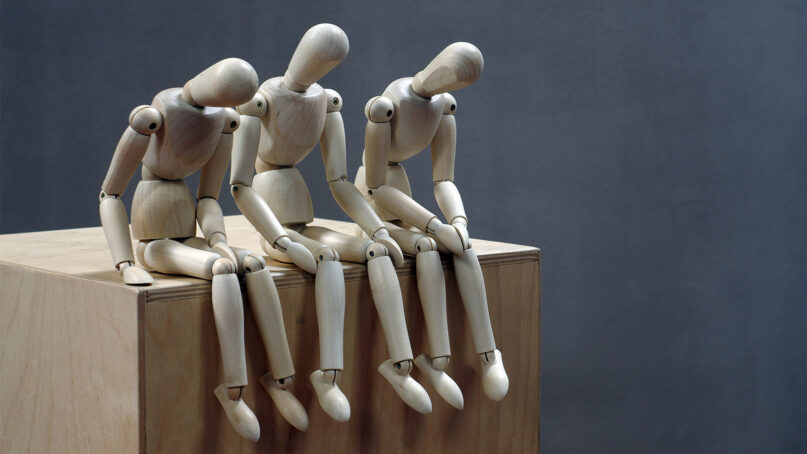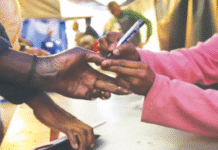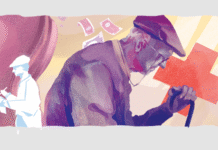Suggestions for what to do when you encounter someone being harassed.

(RNS) — Recently, I visited my local DMV to renew my driver’s license. As I waited in a crowded room of about 25 people, a middle-aged man with a graying beard sat a couple of chairs away from me. Before he could even get settled, he aggressively asked, “Are you from India?” Though startled, I replied I was but that I’ve been living in the U.S. for decades.
Seemingly encouraged to continue, he followed up in an even more aggressive tone and asked, “Are you Muslim?”
Not understanding his intention, I stopped to think about this interaction and where it could be headed before I responded. “Sorry, that is none of your business.”
He took a deep breath and then in an even more aggressive and louder voice announced, “I’m a Christian. All Muslims hate Christians!”
Keeping my tone as polite as I could, I responded by noting that he does not represent all Christians — and just like there are many different types of Christians, there are many types of Muslims.
Despite being in a crowded room and others being able to hear this man harass me, no one intervened. In his loudest voice yet, he rambled something about the Quran being evil while the Bible is the Word of God. Fortunately, by this point my ticket was called and I was able to remove myself from the situation. After finishing my renewal, I privately spoke with a supervisor at the agency about the harassment I experienced — in what should have been a safe space open to everyone.
As I reflect on that experience, I’m saddened to think of what could have happened if he set his sights on a Muslim woman wearing a hijab instead of me. Racism, bigotry, Islamophobia and antisemitism run rampant in our country. People of marginalized identities frequently experience hurtful and harmful situations when we’re merely trying to live our everyday lives. I was just trying to renew my driver’s license.
I wholeheartedly understand why some Muslims prefer to not be in public alone because of fear of how they’ll be treated.
This specific incident was challenging, as the hatred that fuels Islamophobia impacts people like me, who are perceived to be Muslim even when we’re not. As a Sikh who wears a turban in public, I am well aware of the prejudice hurled at anyone who might look like a Muslim. I have had my fair share of being flashed half a peace sign, especially since 9/11.
When I was asked “Are you Muslim?” in such a harsh tone, I could have responded that I am not a Muslim but a Sikh. I could have used it as a teaching moment to engage the questioner if the tone had been more cordial. But I’ve learned from experience that teaching with facts to a strongly biased person in the moment of confrontation does not work.
And what about the question “Are you from India?” Are white immigrants from Europe also asked this question on the basis of their looks? No, they are not.
After living in Central Ohio for over 30 years, will I ever become American enough?
Or because of my turban, beard and dark skin color, will I always remain a foreigner? This is a question I often ask myself. Having lived in the U.S. for so long, I view myself as a Sikh American who once lived in South Asia. Home for me is in Dublin, Ohio. By living in this community, I have changed as a person, but the community around me has been changed by my presence as well.
RELATED: The day my grandparents left our ancestral village in South Asia for good
And although I feel deeply connected to my community, I still worry that my DMV experience happened in public and around dozens of people. No one intervened, no one comforted me, no one confronted the aggressor who was screaming at me. I know these situations can be uncomfortable and, in the moment, sometimes people don’t know how to respond.
But what can you do when you encounter someone being harassed?
First, the person under attack needs solidarity. You can stand up and, instead of confronting the bigot, go to the person under duress, face them and block the sight of the bigot spewing hate. You can also offer words of support and ask if there’s anything you can do that would help them in the moment. None of this happened in my case.
Even after I completed my license renewal and walked across the waiting room to the door, not one person stepped up to say “I am sorry for what you went through.” That doesn’t mean folks in the room necessarily agreed with the screaming man. They just didn’t know what to do and how to react. Unfortunately, inaction is one major reason bigots feel empowered to harm others. Next time you see this happen before you, step up and be an ally of the victim. The world runs because goodness exceeds evil.

Tarunjit Singh Butalia. Photo courtesy of Religions for Peace USA
Silence is complicity and feeds the normalization of hate. As is commonly said, “The only thing necessary for evil to triumph in the world is that good people do nothing.” So please don’t be a part of the silent majority — instead, stand up, speak up and be an ally for those marginalized in our communities.
(Tarunjit Singh Butalia is executive director of Religions for Peace USA and founding trustee of the Sikh Council for Interfaith Relations. He works with Faith in Public Life Ohio and the Interfaith Association of Central Ohio. The views expressed in this commentary do not necessarily reflect those of Religion News Service.)









